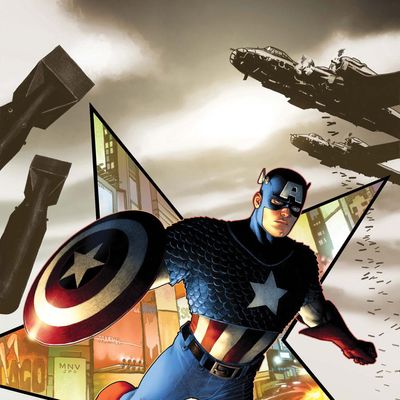
One would be hard-pressed to name a single false move the title character makes in Captain America: The Winter Soldier. Not only does he save the world and the American dream, he does so while remaining flawlessly kind, endlessly moral, and effortlessly charming at all times. Even Superman might find all that perfection to be a bit much.
But with perfection comes blandness. It’s sort of astounding that a character as featureless as Captain America has endured, mostly unchanged, for nearly 75 years after readers first fell for his Hitler-punching adventures. And he’s not just enduring, but thriving: The Winter Soldier grossed more than $300 million worldwide in its opening weekend. But even though a successful and decent movie can be built around him (read our own David Edelstein’s positive review here), Cap remains a fundamentally dull character on screen and in the comics: He only grips us because of his place in a larger story, not because his character is inherently fascinating.
It doesn’t have to be that way. Captain America has the potential to be much more interesting — but only if he’s a jerk.
Being a bit of a prick fits perfectly with the Captain America origin story. Though details have been tweaked over the years, the basics of that story are as follows: Steve Rogers was a scrawny kid who desperately wanted to fight in World War II, was injected with a super-soldier serum that gave him superhuman strength, got trapped in ice in the war’s waning days, and is thawed out in the modern age.
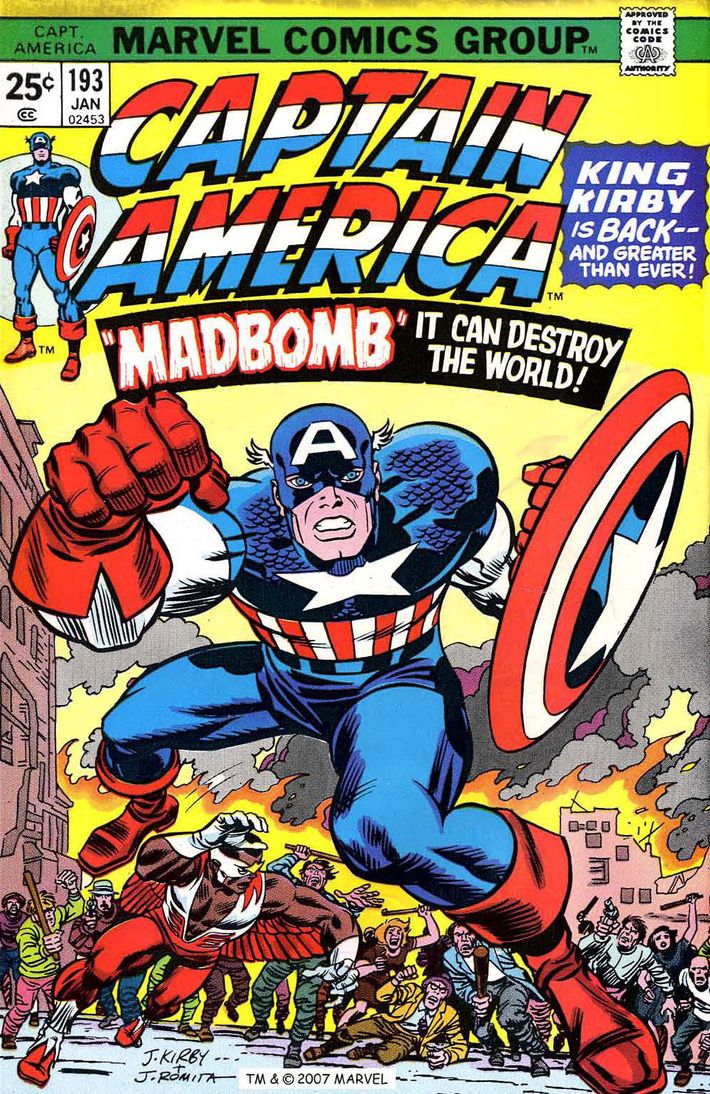
Let’s think about that core story for a minute. Imagine someone frozen in the 1940s being dropped into the 2010s with no experience of the intervening decades. Someone still high on ‘40s social norms, righteous wartime adrenaline, and super-serum. Would he be the gentle, sensitive man we see in Marvel’s films and comics? It’s certainly possible. But isn’t it more likely — and more interesting to imagine — that we would find him difficult and reactionary? That he’d be uncomfortably macho and out of touch with modern values? In other words: Wouldn’t he be more John McCain than Barack Obama?
This isn’t unchartered territory. Cap has been portrayed as a dick in comics in the past (although rarely), and it always yields compelling results.
Undoubtedly the best example of a Cap-as-jerk tale comes from the Marvel film franchise’s biggest single comics influence: Mark Millar and Bryan Hitch’s The Ultimates, a groundbreaking and polarizing series from the mid-2000s. Set in an alternate reality, free of the baggage and continuity of the mainstream Marvel universe, it was a total reimagining of the story of Marvel’s premier superteam, the Avengers. And in it, Captain America was a bully. Definitely not a villain, and definitely someone who does more good than harm — but also definitely not the perfect specimen you’ll find in theaters this weekend.
Leading a battalion of soldiers in 1945, The Ultimates’ Steve Rogers leaps out of a plane without a parachute because, as his sidekick puts it, “He says parachutes are for girls.” When the government thaws him out in the ‘00s, he happily does the bidding of the Bush Administration, beating up Iraqis and leading an invasion of Iran. When kids vandalize his civilian apartment, he doesn’t sit them down and teach them about Greatest Generation–style honor — he just kicks the shit out of them.
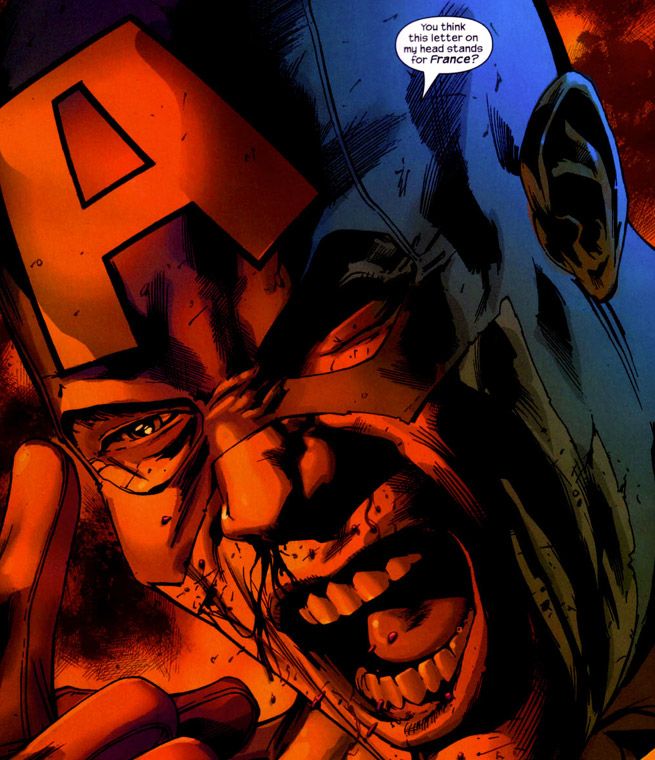
That attitude makes for fascinating character-based storytelling throughout the series: He clashes with the more progressive characters, but also is the only one with the moral conviction to take down a team member who beats his wife. He’s willing to goad the Hulk with some weaponized homophobia, but he does it as part of a brilliant strategy to use the Hulk against an invading alien force. (“You see these spacecraft in the sky?” he screams. “These guys called you a sissy-boy, buddy — you really gonna let them get away with that?”) And all of those character traits are unique to Captain America and his specific origin story: You’d never find that kind of respect for authority in Iron Man or that all-American bluntness in Thor.
That all might be a bit too extreme for some readers and viewers. But you can keep Cap’s core decency and still add rough-edged contours, as proven by another of the comics tales that inspired his film adventures.
In “Winter Soldier,” the story line by Ed Brubaker and Steve Epting that inspired Captain America: The Winter Soldier, we learn that Steve Rogers willingly participated in a form of child labor and child abuse. As it turns out, he knew his WWII sidekick, Bucky, was underage when he was recruited — and that Bucky had specifically been selected because the kid was willing to fight dirty and commit wartime murders that the government didn’t want associated with Cap himself.
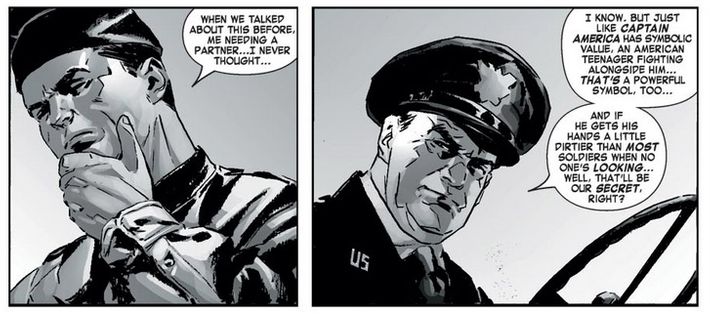
That’s interesting! That raises questions about compliance and individual responsibility! And it doesn’t dehumanize or villainize Captain America. It just adds depth to an otherwise threadbare and pure-hearted character. It’s a shame that, given the opportunity to create a new Marvel universe on the screen and the opportunity to re-tell the Winter Soldier story, Marvel balked at bringing back the intriguing details that made the movie’s source material — in The Ultimates and Winter Soldier — so interesting.
Of course, it makes sense that Marvel movies stick with a Steve Rogers who does no wrong. He makes the story of The Winter Soldier simple by being an endlessly good force that can root out S.H.I.E.L.D.’s nasty impurities. He makes everyone feel warm and fuzzy in the gauzy nostalgia of the first Captain America film. And within the dynamics of the Avengers team, he gets to be the hokey yokel whom the urbane Tony Starks of the world can make fun of.
But wouldn’t it be nice to challenge viewers with a soldier protagonist who does more than make us feel nice about ourselves and our past? This is Chris Evans we’re talking about: If you want examples of how he can be charming while being a prick, look at most of his filmography.
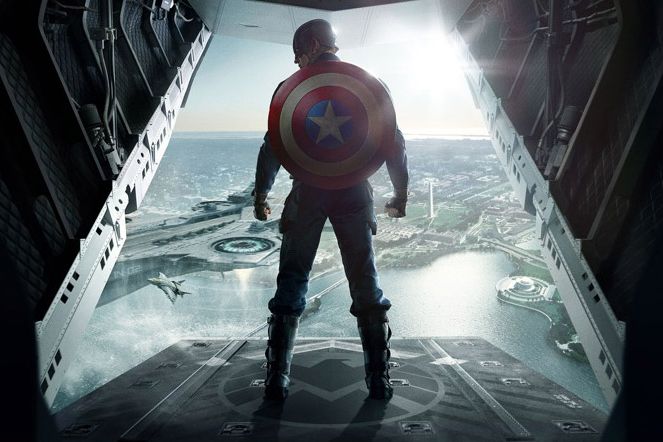
None of this is to say it’s impossible to tell a good story that has a nice-guy Captain America in it. Far from it. In the past 70 years, there have been countless great comics stories either starring or featuring him: the Steve Englehart and Sal Buscema run on Captain America and the Falcon in the mid-to-late ‘70s, Mark Waid’s run on Captain America in the ‘90s, and Jonathan Hickman’s recent run on Avengers all leap to mind. But more often than not, you could replace him in those stories with a generic, charismatic soldier and virtually nothing in the story would have to change.
All of these complaints may call to mind the timeless question about Superman: Why should we care about a guy who’s invincible and endlessly nice? But in recent decades, comics writers have done a great job explaining that Superman is basically a god, capable of doing godlike deeds and inspiring us to be as good as we can be. Captain America isn’t a god; he’s just a soldier. In 2014, of what artistic good is a flawlessly nice soldier?
Can’t we get at least a little rough and dirty with this 75-year-old warhorse? To borrow a phrase from the ultramacho Steve Rogers of The Ultimates: Hey, Marvel, what are you waiting for, ladies? CHRISTMAS?”

